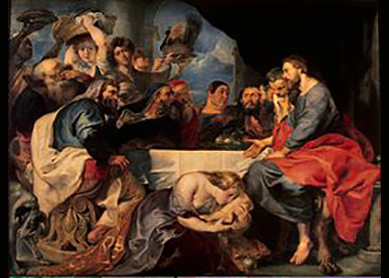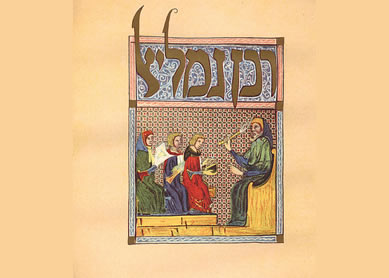“How do you catch a cloud and pin it down?” ask the nuns in The Sound of Music, lamenting their inability to pin down the irrepressible Maria. Historians in quest of the Pharisees might utter the same refrain.
The Pharisees were a Jewish group that flourished in the late Second Temple period. Despite constituting but a fraction of the Jewish population, the Pharisees elicit historical fascination because (a) they are generally understood as the forerunners of the rabbis and (b) the Gospels portray them as among Jesus’ primary rivals. Yet what sort of group the Pharisees were and what role they played in Jewish life elude scholarly consensus. Historians have portrayed them as a religious sect, a political party, a philosophical order, a bureaucratic or scholarly class, or some combination thereof.
Why are the Pharisees so hard to pin down?
It is a problem of sources. The sources mentioning the Pharisees are limited in number, have limited perspectives, and have axes to grind. Some of them were written much later than the periods they depict. Historians therefore dispute how the evidence ought to be prioritized and interpreted.
Josephus (37–circa 100 C.E.) designates the Pharisees a “sect” and a “philosophy” distinguished by their belief in fate and the resurrection of the dead, their precision in studying the Torah, and their adherence to an extrabiblical “tradition of the fathers.” On occasion he highlights their political activity, such as their influence during the reign of Salome Alexandra or their sway among the masses. But some historians wonder whether his portrait was designed more to meet Roman literary conventions than to reflect reality, and others worry that Josephus, who might have been a Pharisee himself, aggrandized their significance.
The Gospels and Acts likewise mention the Pharisaic belief in resurrection and their “tradition of the elders” (for example, Mark 7:3, Acts 23:8). Pharisees are also said to fast, avoid eating with sinners, wear fringes and phylacteries, permit divorce, make vows, tithe, refrain from healing or plucking grain on the Sabbath, and practice ritual purity outside the temple by washing dishes and hands before eating. But these %%writings, which often depict Pharisees as the hypocritical or legalistic foils against whom the teaching of Jesus or the apostles is proclaimed, may reflect later Christian (mis)impressions.
In the Mishnah (circa 200 C.E.) and Tosefta (circa 300 C.E.), the rabbis attribute many legal decisions to the Pharisees or to protorabbis widely recognized as Pharisees (for example, Hillel, Shammai, and Gamaliel), especially regarding tithing and purity; yet, these texts show an affinity for the Pharisees, and their lateness leads historians to debate how accurately they describe Jewish life in the first century C.E.
Reconstructing the identity of the Pharisees therefore requires historians to navigate the biases and limitations of the sources and to identify points where they intersect. Unfortunately, this method has yielded vastly different portraits from equally capable historians.
Were the Pharisees hypocrites and legalists?
Hypocrites, probably not. The age-old association of the Pharisees with hypocrisy stems from scenes in the Gospels (for example, Matt 23:1-39) in which Jesus denigrates the Pharisees as religious phonies who demand from others a strictness they themselves fail to observe. Many historians doubt that Jesus himself ever made such an accusation, however. More likely, the evangelists, who were vying with the Pharisees (or early rabbis claiming the mantle of the Pharisees) in the wake of the Roman destruction of Jerusalem in 70 C.E., retrojected their own hostility onto the ministry of Jesus. Not Jesus but Matthew and Luke thought the Pharisees were hypocrites. Were they right? The charge is hard to square with Josephus’s insistence that the Pharisees were lenient in imposing punishments and held the esteem of the masses. A Pharisee here or there may have exhibited superficial piety, but to indict them collectively on account of Matthew and Luke seems unwarranted. Much of the depiction of the Pharisees in the Gospels may derive from their similarities to the early Jesus movement and that movement’s frustration that this similar group did not accept Jesus as the Messiah.
Were they legalists? It depends on what that means. The Pharisees were widely regarded as meticulous interpreters of the Torah. They also adhered to extrabiblical traditions, many of which called upon Jews to be scrupulous about eating, tithing, and ritual purity, possibly as a way to translate the holiness required at the temple into day-to-day life. Paul probably alludes to such scrupulousness when he says he had been “as to the law, a Pharisee” (Phil 3:5). Such conscientious commitment to Jewish law might be construed as legalistic, but usually that word connotes hollowness in legal observance—“tithing mint, dill, and cumin,” as Matthew puts it, “while neglecting the weightier matters of the law” (Matt 23:23). Aside from the blatantly unsympathetic testimony of the Gospels, however, no evidence suggests that the Pharisees lacked a commitment to “justice, mercy, and faith” (Matt 23:23), and thus the word legalistic is best avoided in reference to the Pharisees.
Bibliography
- Neusner, Jacob, and Bruce D. Chilton, eds. In Quest of the Historical Pharisees. Waco, TX: Baylor University Press, 2007.
- Mason, Steve. Josephus and the New Testament. 2nd ed. Peabody, MA: Hendrickson, 2003.
- Saldarini, Anthony J. Pharisees, Scribes and Sadducees in Palestinian Society. Wilmington, DE: Michael Glazier, 1988.





